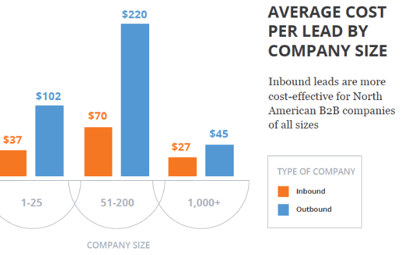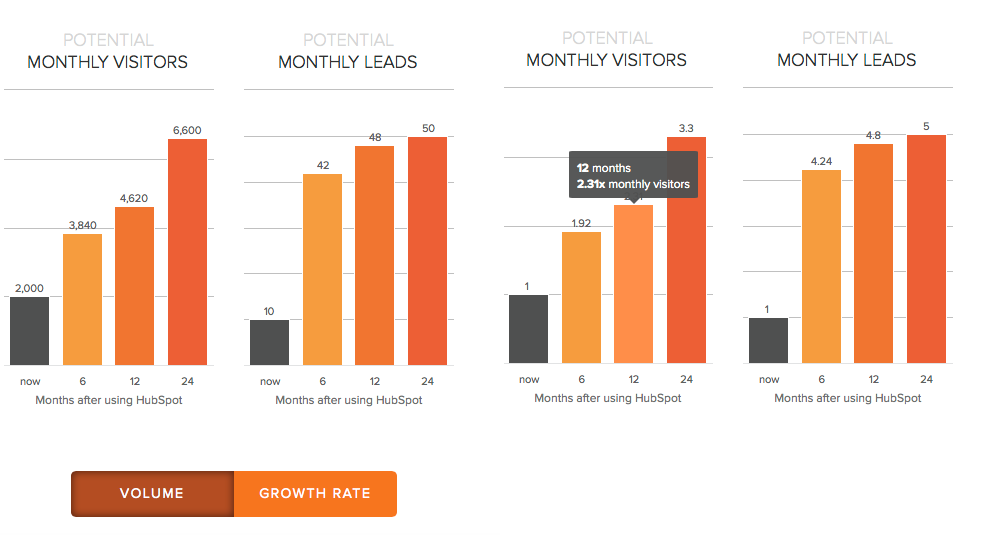What does B2B Inbound Marketing Cost in 2015?
Find out how much should you expect to pay an agency for complete B2B inbound marketing services in 2015, and how to choose the best agency for you.

It’s clear to see that B2B Inbound Marketing is naturally the next phase in marketing. Many B2B tech companies are now exploring this marketing method as their buyers move online. Marketers are inevitably asking themselves "what will inbound marketing services and consultancy cost?”
Inbound marketing is cheaper than outbound marketing
Sofware vendor HubSpot's most frequently quoted stat is that inbound marketing costs 61% less than outbound programmes like direct mail, advertising, unsolicited email marketing etc. That figure comes from 2012. The company’s latest State of Inbound Marketing report however, shows that if anything the gap between outbound and inbound is now even bigger:

That’s good to know but what do you need to do in order to save all that money?!
Which is best for inbound: agency or internal resourcing?
Many companies initially go down the internal resourcing route when they begin an inbound programme. This may seem cheaper - however, without specialist expertise, it can be difficult to achieve a high volume of leads and revenue, costing you more in the long-haul.
Today most forward thinking agencies - and that includes those at the forefront of the inbound revolution, make their money not from high hourly rates but through a combination of smarter work practices that come from experience i.e. achieving more with less - and just as importantly, from the efficiencies that derive from sharing access to skills and resources among more than one client. For example, you’ll need copywriting skills for an inbound programme but you won’t need a full-time copywriter unless you intend to grow very fast. Whilst some inbound marketers can combine the skills of a creative copywriter with the analytical skills of a planner and a SEO professional, most people are better at one or two of these skill-sets. So, you’ll either have to go down the route of having one or two all-rounders or have several specialists with resulting high costs. Too many specialists will damage your ROI while quickly emptying your budget pot. High quality generalists are very hard to find. All-rounders like Ben Stokes aren’t easy to come by as England test cricket fans know, even though they are absolutely brilliant when you do get lucky.
There is a middle road where you make use of an agency’s knowledge and experience to acquire skills in order to go it alone further down the line. This can work well and we offer intensive training packages (up to £6,000) as well as reduced price retainers where we share the work with in-house marketing teams from the beginning and gradually reduce our workload over a 12 month period as new resources are brought into the client teams.
So how much inbound do you need?
That depends on what you want to achieve.
The first important point is that all successful inbound marketing campaigns start with SMART Goals.
- How many new business deals do you require?
- How many leads do you need to generate that much business?
- How many website visitors do you need to generate the required number of leads?
Once you have a clear picture of what you are trying to achieve, you can take expert advice on how much work needs to be done to achieve those goals. Then you can work out a cost and a potential return on investment based upon likely and planned outcomes and new sales generated through your inbound marketing programmes.
HubSpot’s research of its growing B2B customer base and our own experience working with B2B tech companies over the past three years gives us a pretty good idea of how much work needs to be done to achieve an average growth in leads through an inbound marketing programme and what that means in terms of the number of visitors, leads, opportunities and revenue generated.
Let’s take this example: a medium-sized software company selling enterprise or SaaS software. At the beginning of the programme their website marketing metrics look like this:
- 2000 unique website visitors every month
- 10 unqualified leads/enquiries per month
- 1 new sale every other month
- Revenue/customer £50,000
An ‘average’ HubSpot customer carrying out a planned inbound marketing programme to a good level and on a consistent basis (assuming that the people carrying out the work are trained and experienced) would expect to produce this kind of outcome:

If leads to customer conversions stayed constant you’d see a projected 4.8 fold increase in revenue derived from your website marketing in the first year. So in this example that would equate to £1.4m+ of extra revenue. In reality, conversion rates increase because the leads produced are better qualified.
Let’s see what that kind of performance is likely to cost:
The elements of inbound and what they cost
As you may know there are five main stages to every inbound campaign, each requiring a different bundle of activities, deliverables and skills:
1. Planning your campaign: analysis, content planning
2. Attracting visitors to your website: blogging, design, programming and development, social media management and SEO
3. Converting them into leads: calls to action design and copywriting, ebook or other downloadable content design and copywriting
4. Nurturing them until they are ready to buy: email and landing page layout and copywriting, marketing automation management
5. Analysing and optimising your results so that they can be improved in future: analytical skills and working knowledge of a multitude of online tools or a single management and reporting platform like HubSpot
Let’s run through each of these and how much of each stage is required to get the kind of results that we’ve illustrated above using the HubSpot ROI tool and what that will cost.
Planning
We normally spend the first month researching our clients, their markets, website performance to date, as well as their on-site and off-site SEO performance. We’ll develop detailed Personas and make informed insights into every question that every type of potential customer might ask. Aided with this information, we can them form the basis of a 12 month content plan.
With the workload split between a content manager and SEO/social media specialist, we would aim to complete this initial planning stage within a few weeks, equating to about £6,000 for this stage of work.
Blogging
Blogging is the most important thing that you can do once you’ve laid the foundations of an inbound marketing strategy. 8-12 blogs a month is a good goal post for achieving the 300% increase in website visitors that we aimed for in in our example. You should allow c £1,600 - £2,400 for that including research, writing, proofing and creating any graphs/graphics. This cost however, will be considerably less if you are working with an agency to develop the ideas behind the content. This is ideal, not just because it is cheaper but it will resonate better with your target personas.
Downloadable offers
Writing and designing a downloadable offer to put behind a gated form is a vital part of an inbound campaign as this is the mechanism that you use to capture contact details, qualify leads and generate your marketing automation. The cost here will depend upon the length and complexity of your piece for anything from a short ebook (1000 words) to a full length ebook (2000 words). Including planning and research, copywriting, proofing, design and graphics: you should allow £1-2000 a month.
Social media management and engagement
LinkedIn and other social media platforms enables you to share content and bring leads to your website - creating audiences for blogs and downloadable high value media when they are first published, having a positive impact on longer-term off-site SEO. We divide our time between three approaches:
- Initial sharing and invitation to comment on content when it is first published
- Updating and sharing older content. Content is the gift that keeps on giving! One of our most popular blogs is our website design predictions from back in 2013
- Looking for opportunities to engage in online conversations, deploying our content to help people understand and solve problems
Together these activities can easily take an hour or more a day if you have a good blog production rate. As your catalogue of content increases, this task will inevitably get bigger so allow a minimum of £700/month for this.
Uploading content, designing landing pages and creating automated email workflows
You should aim to create a new piece of downloadable content each month. This inevitably requires copywriting and design of landing pages, outbound and follow-up emails as well as uploading content through your CMS, email software, automation or inbound tool. The more systems that you have to work with the more time-intensive this process is. That is one of the reasons that we use HubSpot. It allows us to work more efficiently and do more for less. People often underestimate this type of work but you should allow £700- £1500/month.
On-site optimisation, analysis, reporting and planning
There are lots of moving parts of an inbound programme. Traffic to pages, call to action metrics, landing page conversion rates, email workflow pull-through rates, performance of different campaigns and the effectiveness of content aimed at different personas in attracting and converting sales leads. We organise our client programmes through weekly content production meetings and monthly analysis: reporting against key goals. You should expect all this to cost £1000 + each month.
So, overall to achieve the kind of goals that we sketched out in our example above you should expect to pay an agency £4-8,000/month depending upon your own resources.
One last thought: You wanted to know how much inbound marketing is going to cost you. I could have avoided that question by telling you that I can’t give you a price because my business is DIFFERENT - too complex, every client’s needs are unique etc etc. You wouldn’t have been happy with that answer. You understand that a precise price needs a precisely scoped project but you wanted an order of cost. That’s a fair expectation and your customers will be likely to feel the same way. Please don’t make the mistake of avoiding the question in your inbound marketing and on your website.
 Ian Guiver
Ian Guiver